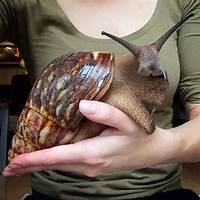How to Keep Snails as a Pet
Snails are a fascinating and low-maintenance type of pet that can make a great addition to any home. With just a little bit of care, these gentle creatures can thrive in captivity for many years.

Choosing a Snail
There are many different species of snails available in the pet trade. Some popular options include the African land snail, the garden snail, and the mystery snail.
When choosing a snail, it's important to make sure that you select a healthy specimen. Look for a snail with a strong, unbroken shell and a firm body. The snail should also be active and alert.
Setting Up a Habitat
Snails need a warm, humid environment in order to thrive. The ideal temperature for most snail species is between 75 and 85 degrees Fahrenheit (24 to 29 degrees Celsius).
The snail's habitat should be large enough to allow it to move around freely. It should also include a water dish, a food dish, and a place for the snail to hide.
The substrate in the snail's habitat should be moist but not too wet. Peat moss, coconut fiber, and vermiculite are all good choices for snail substrate.
Feeding Your Snail
Snails are herbivores and their diet should consist primarily of fresh vegetables and fruits. Some good options include carrots, celery, apples, and grapes.
In addition to fruits and vegetables, snails also need a source of calcium in their diet. This can be provided by adding crushed eggshells or cuttlebone to their food.
Caring for Your Snail
Snails are generally very easy to care for. However, there are a few things you can do to keep your snail healthy and happy.
- Mist your snail's habitat with water every day to keep the humidity levels high.
- Change the substrate in the habitat every few weeks to keep it clean.
- Feed your snail a variety of fresh vegetables and fruits.
- Provide your snail with a source of calcium in its diet.
- Handle your snail gently and wash your hands before and after handling it.
Additional Tips
- Never release a pet snail into the wild. Pet snails can spread diseases to wild snails and disrupt the local ecosystem.
- If you have any questions about caring for your snail, be sure to consult with your veterinarian.
Declaration: All article resources on this website, unless otherwise specified or labeled, are collected from online resources. If the content on this website infringes on the legitimate rights and interests of the original author, you can contact this website to delete it.




